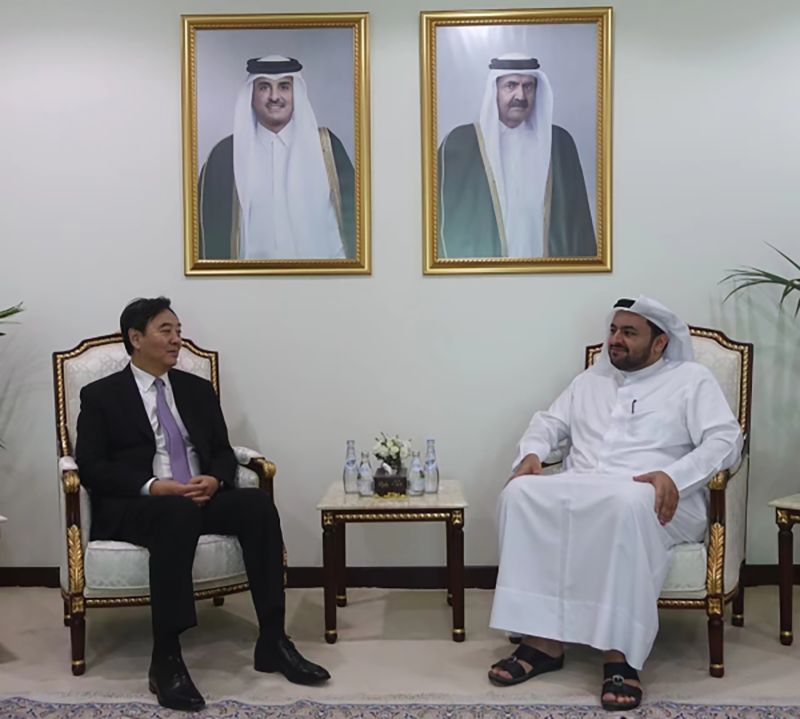
Muslim Majority nations gather in Beijing for Israel-Hamas conflict negotiations as China seeks mediator role

China aims to mediate the Israel-Hamas conflict by hosting talks with officials from Arab and Muslim majority nations in Beijing As Beijing intensifies its efforts for peace, this article explores China's role in de-escalating the ongoing crisis
Chinese Foreign Minister Wang Yi held talks in Beijing on Monday with officials from Arab and Muslim majority nations to discuss the de-escalation of the Israel-Hamas conflict. China is intensifying its efforts to contribute towards a ceasefire, with the participation of representatives from Saudi Arabia, Jordan, Egypt, the Palestinian National Authority, Indonesia, and the head of the Organization of Islamic Cooperation.
Beijing termed the visit as a chance to engage in extensive communication and coordination regarding de-escalation of the ongoing conflict between Palestine and Israel, safeguarding civilians, and achieving a fair resolution to the Palestinian problem. Concurrently, insider information reported by CNN hints at a potential agreement on the release of certain hostages currently held by Hamas. This development follows weeks of negotiations involving the United States, Israel, and the militant group, with mediation from Qatar, a Gulf state.
Beijing and Washington, the longtime major power brokers in the region, have found themselves in disagreement over their respective approaches to the conflict. Beijing, in particular, has faced criticism for failing to condemn Hamas or mention the group in its statements, while also expressing disapproval of Israel's retaliatory actions. This has provoked backlash from Israeli officials.
In response to a deadly attack by Hamas on its territory on October 7, Israel has carried out weeks of bombardment and ground operations in the Hamas-ruled enclave of Gaza. The Israel Defense Forces report that over 200 hostages were taken in that attack.
China has been actively engaged in seeking a resolution to the conflict in order to bolster its standing as a significant global power. In its efforts, Beijing recently sent a peace envoy on a diplomatic tour of multiple nations in the region. Additionally, China has been vocally advocating for an urgent ceasefire at various United Nations forums, including the Security Council, where it currently holds the presidency on a rotational basis.
Last week, the UN body approved its inaugural resolution concerning the conflict. The resolution entailed urging Hamas to release all hostages promptly and advocating for the establishment of extended humanitarian corridors within the enclave to safeguard civilians. The United States and the United Kingdom opted to abstain from voting, as they felt the resolution failed to condemn Hamas.
Chinese Ambassador Zhang Jun commented on the outcome of the vote, implying criticism towards the US, stating, "This resolution currently represents a preliminary measure founded on minimal consensus due to reasons widely acknowledged, notably the consistent and obstructive actions of a permanent member of the Council."
Chinas push for peace
China has seized the conflict as a chance to enhance its existing alliances with various nations in the Arab region. Moreover, it has positioned itself as a prominent advocate for a "two-state" resolution, aiming to establish an autonomous Palestine. This initiative is widely recognized as a crucial step towards guaranteeing enduring peace.
Chinese and visiting officials in Beijing today and tomorrow are expected to discuss ways to reinvigorate a stalled peace process. It was a significant point of discussion during the recent 10-day visit to the Middle East by China's special envoy for the region, Zhai Jun. According to the Chinese Foreign Ministry, he visited Egypt, Qatar, the UAE, Saudi Arabia, and Jordan.
Last week, the envoy traveled to Turkey and Bahrain to hold meetings with officials. In addition, Zhai engaged in discussions regarding the "regional situation" with representatives from Singapore, the United States, and Europe at an international conference.
On October 19, 2023, Zhai Jun, the Special Envoy of the Chinese Government for the Middle East Issue, held a meeting with Mohammed bin Abdulaziz Al-Khulaifi, the Minister of State at the Qatari Ministry of Foreign Affairs, in Doha. During the meeting, the two discussed the ongoing situation between Palestine and Israel.
China's special envoy is currently on a mission in the Middle East, with peace being one of the key objectives. However, it is worth noting that Zhais itinerary does not currently include visits to Israel, the Palestinian-controlled territories, or Iran, as confirmed by the Chinese Foreign Ministry. In a recent development, Wang had a telephone conversation with Israeli Foreign Minister Eli Cohen last month. It remains uncertain if China has been engaging with Hamas officials amidst the ongoing conflict.
Palestinian Foreign Minister Riyad al-Maliki from the West Bank-based Palestinian National Authority is among the officials visiting Beijing this week.
Earlier this month, China sent the head of its Foreign Ministry's West Asian and North African affairs department to Iran. The conflict was discussed during the visit, as mentioned in a post on the department's WeChat social media account.
Iran has been a longtime supporter of both Hamas and Hezbollah, based in Lebanon.
According to a senior US official, during the lengthy discussions between Chinese leader Xi Jinping and US President Joe Biden in California last week, Biden urged Xi to utilize China's influence over Iran in order to caution against further regional escalation.
During the discussions, Foreign Minister Wang Yi informed the audience that they had already engaged in conversations with the Iranians regarding the matter, as stated by the senior official.
Furthermore, Biden emphasized to Xi that he considers Hamas distinct from the Palestinians. The United States regards Hamas as a terrorist organization responsible for the ongoing hardships faced by the Palestinian people and supports Israel's right to retaliate against the group.
While discussing the ongoing situation, Beijing chooses to portray it as a Palestinian-Israeli conflict rather than mentioning Hamas specifically. The report benefitted from contributions by Xiaofei Xu, Martin Goillandeau, Wayne Chang, Mengchen Zhang, and Sophie Jeong from CNN.







